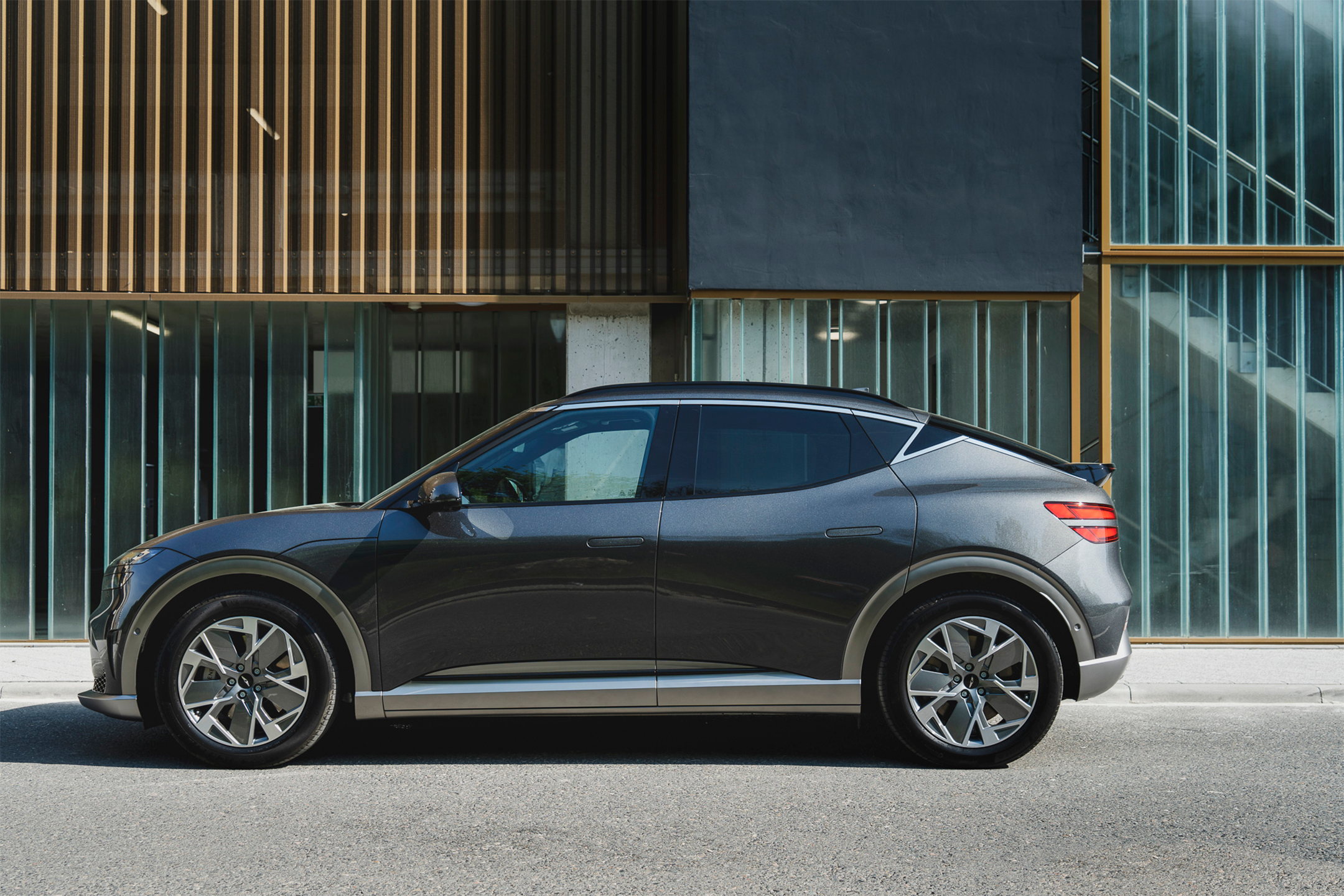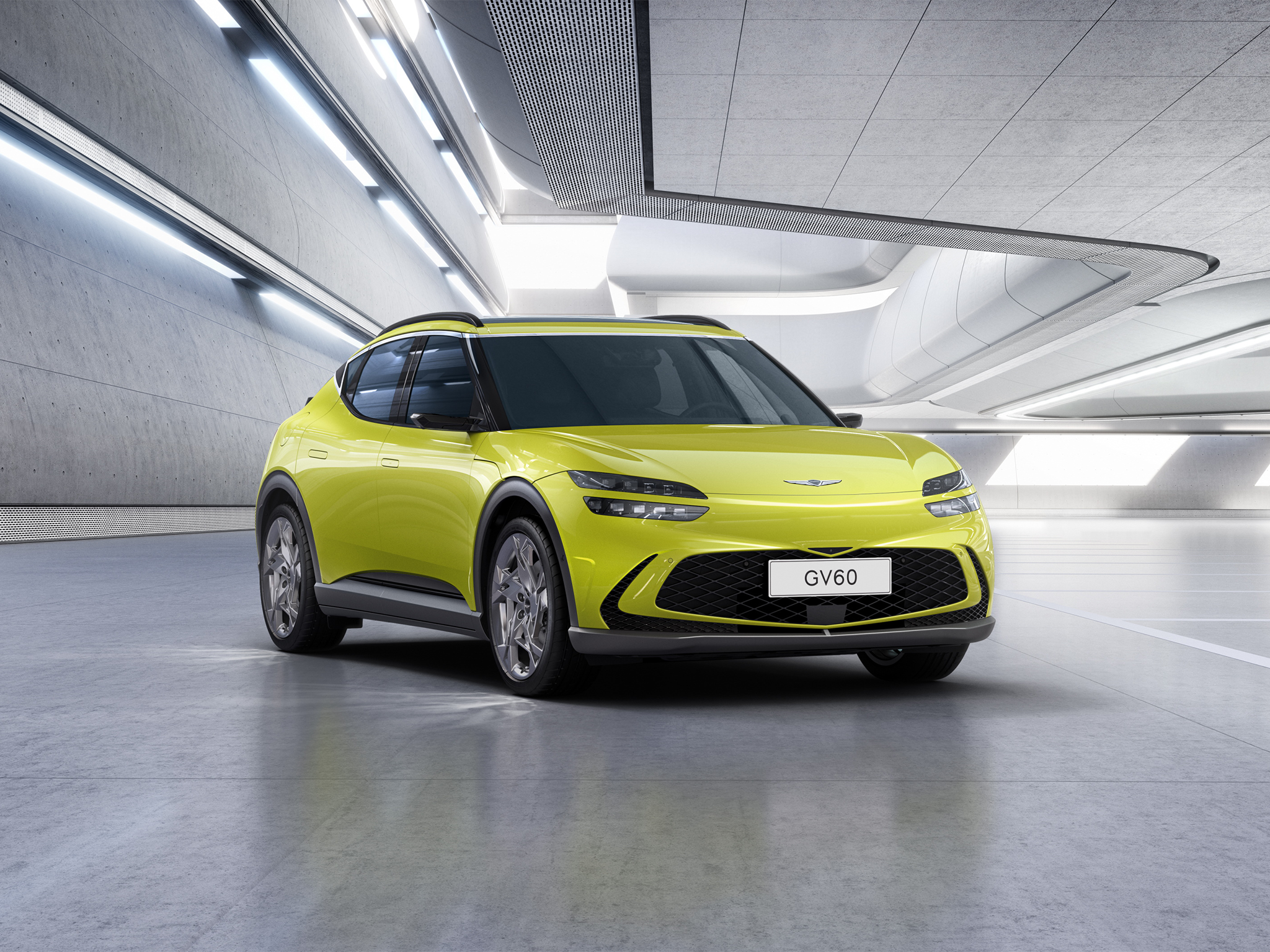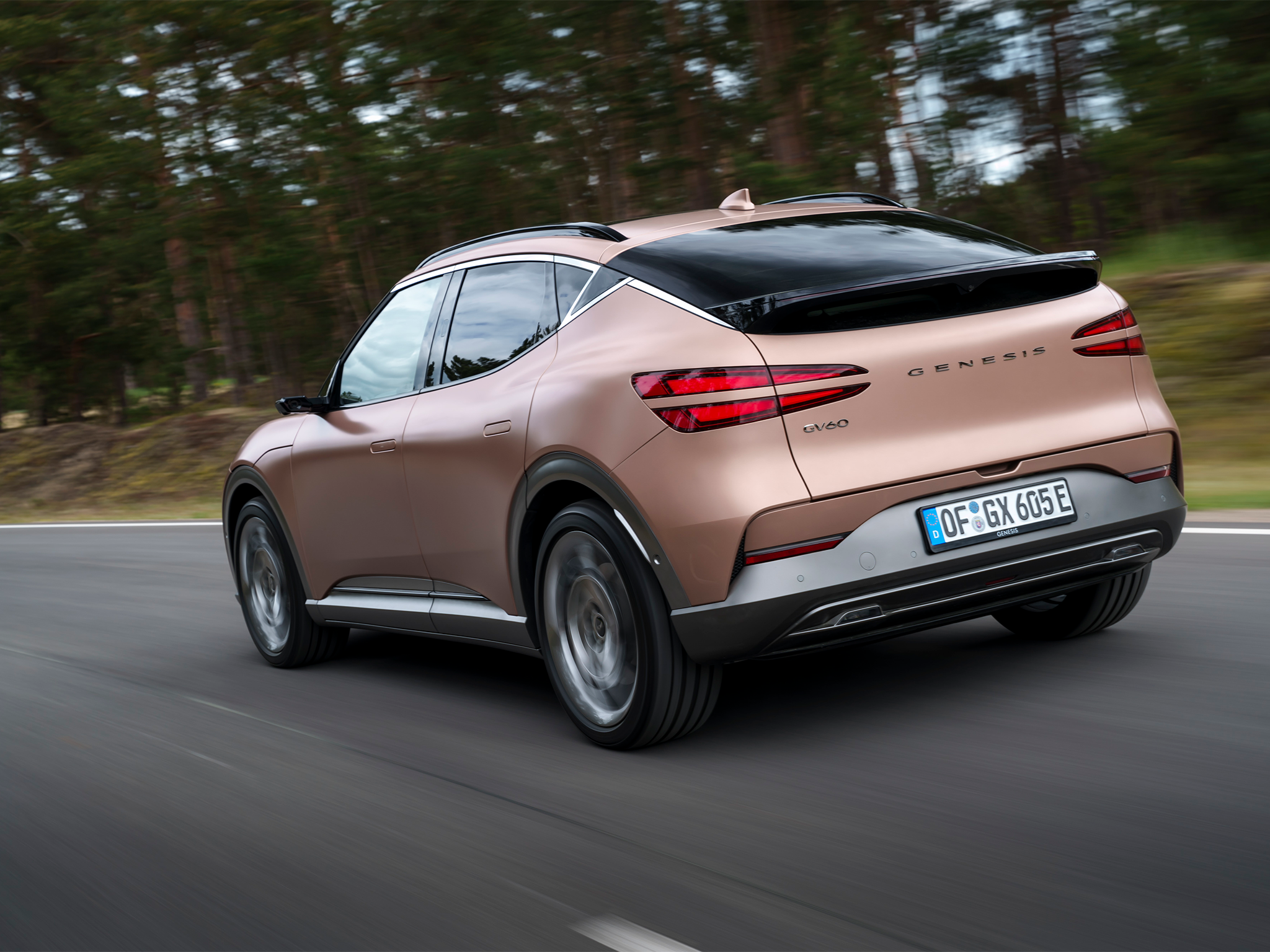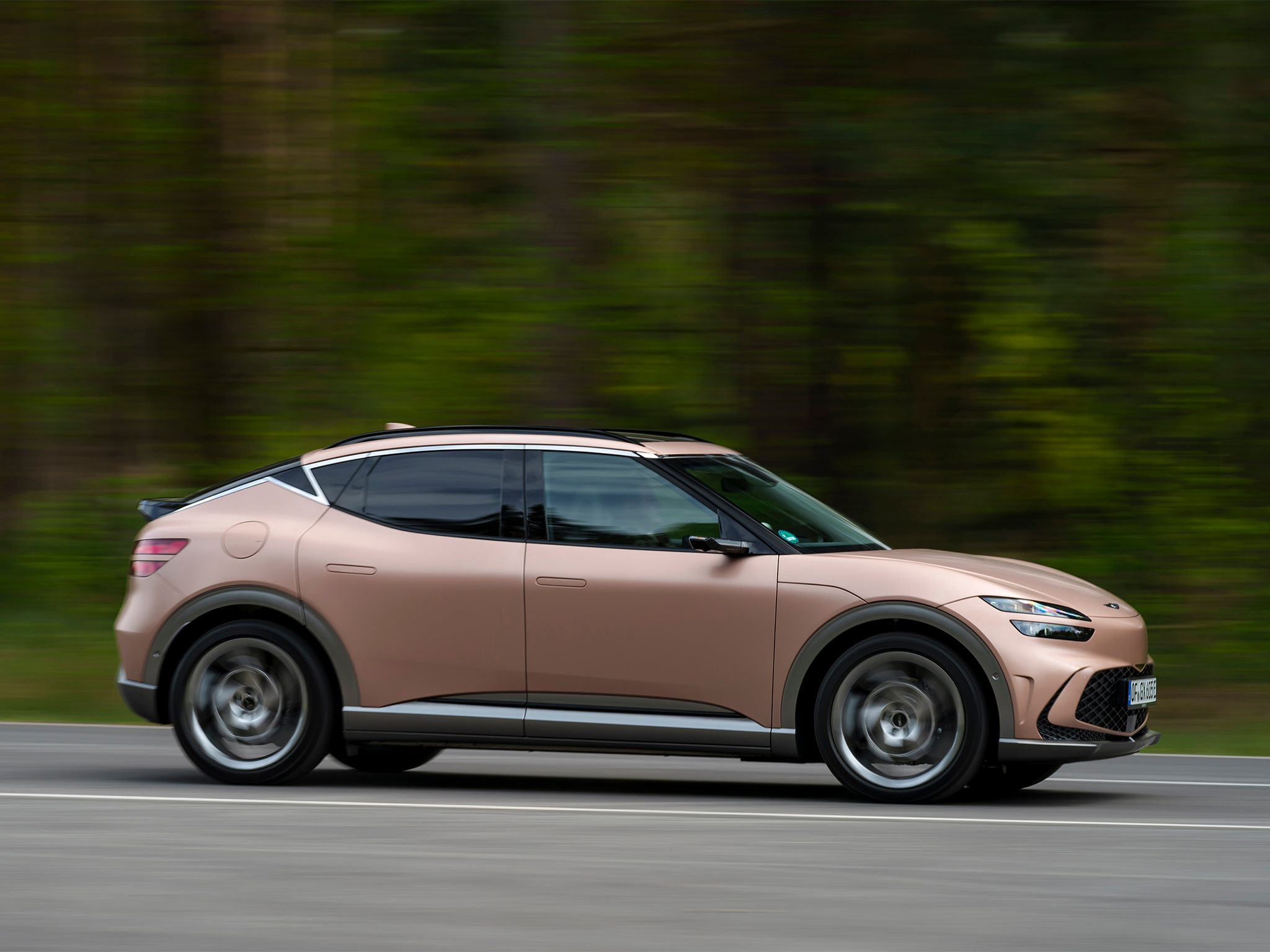Genesis GV60 review: This electric SUV boasts fast charging
Mid-size electric SUV boasts fast charging, over 320 miles of range and a lot of kit included as standard. Distinctive interior is comfortable and packed with tech, including biometric security.

The Independent's Electric Vehicles Channel is sponsored by E.ON Next.
Founded in 2015, Genesis is a Korean car brand owned by the Hyundai Motor Company, which is also responsible for Hyundai and Kia. Between them, the three produce a strong range of EVs that all share a platform called E-GMP. This gives them faster charging than many other electric cars, at up to 239 kW in the case of the Genesis.
Of the three brands, Genesis is the more luxurious option and its prices reflect that status. The GV60 starts at around £54,000, making it about £10,000 more expensive than the Kia EV6. For that you get an upmarket interior that is packed with tech, and a claimed maximum range of over 320 miles.
A five-seat coupe SUV, the GV60 is available in three configurations; the base model has a single motor, while the mid-tier and flagship cars both have two motors and all-wheel-drive. All three have the same 77.4 kWh battery, meaning the cheapest and least powerful version has the longest range.
How we tested
I drove a couple of hundred miles in the Genesis GV60 over the course of several days and used it as my only car. This included navigating London city traffic, longer motorway journeys and running daily errands.
Genesis GV60: From £54,105, Genesis.com

Independent rating: 8 /10
- Pros: Fast charging, great interior, lots of tech as standard
- Cons: Quickly gets expensive, cameras aren’t as good as mirrors, mediocre boot space
- Price range: £54,105 to £67,705
- Battery size: 77.4 kWh
- Range: 321 miles
- Miles per kWh: 3.5
- Maximum charge rate: 239 kW
- Charging cost per 100 miles on E.ON Next Drive: £1.83
Battery, range, charging and performance
You might not have heard of Genesis, but the brand is a part of the same company as Kia and Hyundai. This means the GV60 shares the same excellent platform, called E-GMP, as the Kia EV6 and Hyundai Ioniq 5, both of which are highly-praised EVs with a strong range, good efficiency and very fast charging capabilities. All three versions of the GV60 have a 77.4 kWh battery and an 800-volt electrical system that can handle a maximum charge rate of 239 kW. This means a 10-80 percent charge can take just 18 minutes with a sufficiently powerful charger. A full home charge from empty takes around eight hours.
The three-model lineup starts with the single-motor, £54,105 GV60 Premium, which has 225 hp, accelerates to 60 mph in 7.8 seconds and has a range of 321 miles. The GV60 Sport costs slightly more and has 322 hp but less range, at 292 miles. The flagship Sport Plus has two motors, all-wheel-drive and almost 500 hp. It hits 62 mph in 4.0 seconds but has the least range, at 289 miles. It also costs significantly more, at £67,700.
Interior, practicality and boost space
The GV60 has one of the most distinctive interiors of any car on sale today. From the three dashboard displays and optional wing cameras instead of mirrors, to the gear selector, which reveals itself from under a glowing, rotating crystal orb, there’s a lot to digest. But do so, and you’ll find the GV60 is a lovely place to be; it’s comfortable, luxurious, remarkably quiet on the move, and the switchgear is all logically designed and positioned.
Front row occupants have lots of space, while the second row is slightly compromised by the tapered roofline and how the smaller central seat is raised and therefore less suitable for adults.
Rear visibility could be better, owing to the sloping roof. But all models come with front and rear cameras, and the driver display shows your blind spot when indicating, which helps spot cyclists at junctions. Cameras for wing mirrors are an optional extra, and while clever they lack the parallax effect of a reflected image, and simply don’t perform as well as regular mirrors, so we wouldn’t recommend them.
At 432 litres the GV60’s boot space is fine but nothing special, and well short of the Tesla Model Y.

Technology, stereo and infotainment
Even the entry-level GV60 is packed with tech. All seats are heated, while the front are also ventilated and electrically adjustable, plus the driver gets a massage function too. Apple CarPlay and Android Auto are standard, plus wireless phone charging, keyless go and ambient lighting. There’s even a biometric security system, where facial recognition unlocks the car, then a fingerprint reader is used to turn it on.
The dashboard is topped by a pair of 12.3-inch screens that handle the infotainment system and driver information. Below them is a third display that uses a combination of a touch screen and physical buttons for the climate control. All trim levels have the same standard stereo, which can be upgraded to a 17-speaker Bang & Olufsen system with active noise cancelling for £990. We think that’s money well spent.
As is almost always the case with an EV, the best value is found in the model with the longest range, not the most power. While it might be tempting to spend an extra £4,460 on the Sport trim level, unlocking 20-inch wheels, that money is better saved, or partially spent on the B&O stereo and panoramic roof. The extra £13,600 commanded by Sport Plus is not worth it, since the base model is plenty quick enough and offers the most range.
Like all other EVs, running costs are low, and especially so if charged at home. That said, be mindful of how quickly the GV60 can fill its battery when hooked up to an ultra-fast (and equally expensive) public charger. Handily, it’s easy to set a maximum charge percentage to stop you accidentally paying for more than you need. Luxury cars like the GV60 are generally more expensive to insure, but this will depend on your personal circumstances.

Genesis GV60 rivals
- Kia EV6
- Hyundai Ioniq 5
- Tesla Model Y
FAQs
How long does it take to charge?
The Genesis GV60 has a maximum charge rate of 239 kW, which is more than many other EVs. It can fill its battery from 10 to 80 percent in as little as 18 minutes when using a suitably powerful public charger, while a full charge at home takes about 10 hours.
How much does it cost - is it worth it?
Although it shares its platform with the Kia EV6 and Hyundai Ioniq 5, the Genesis GV60 is positioned as a more premium offering, and starts at £54,000. You get a lot of kit as standard, and a premium interior too, but there’s really no need to splash out the extra £13,600 for the extra performance (but less range) of the Sport Plus variant.
Who is Genesis?
Genesis Motor was founded in 2015 and is a part of Hyundai Motor Company, a Korean company that also oversees the Kia and Hyundai brands. EVs across the three companies share similar electric platforms, and crucially they use the same 800-volt, fast-charging technology.
The verdict: Genesis GV60
The Genesis GV60 is an upmarket relative of the Kia EV6 and Hyundai Ioniq 5, with which it shares the same platform and rapid charging system that fills the battery from 10 to 80 percent in under 20 minutes.
It’s stylishly designed inside and out, with a very well-equipped interior that’s as distinctive as it is comfortable. The GV60 was recently upgraded to include facial recognition and a fingerprint reader, so you can leave the key (and even your phone) at home. Highlights include heated and ventilated seats, laminated glass for a quieter cabin, two-zone climate and a whole host of driver safety tech fitted as standard.
Since they all have the same battery capacity, the less powerful, single-motor model with over 320 miles of range is the pick of the bunch.






Join our commenting forum
Join thought-provoking conversations, follow other Independent readers and see their replies
Comments